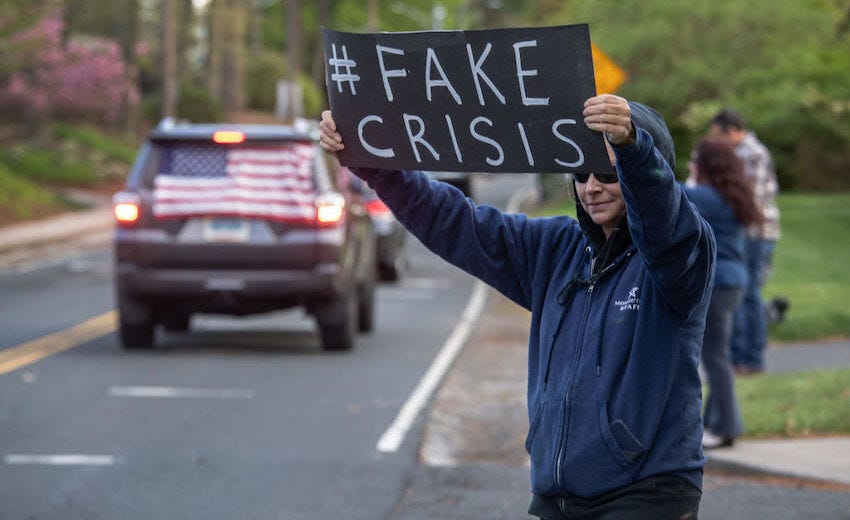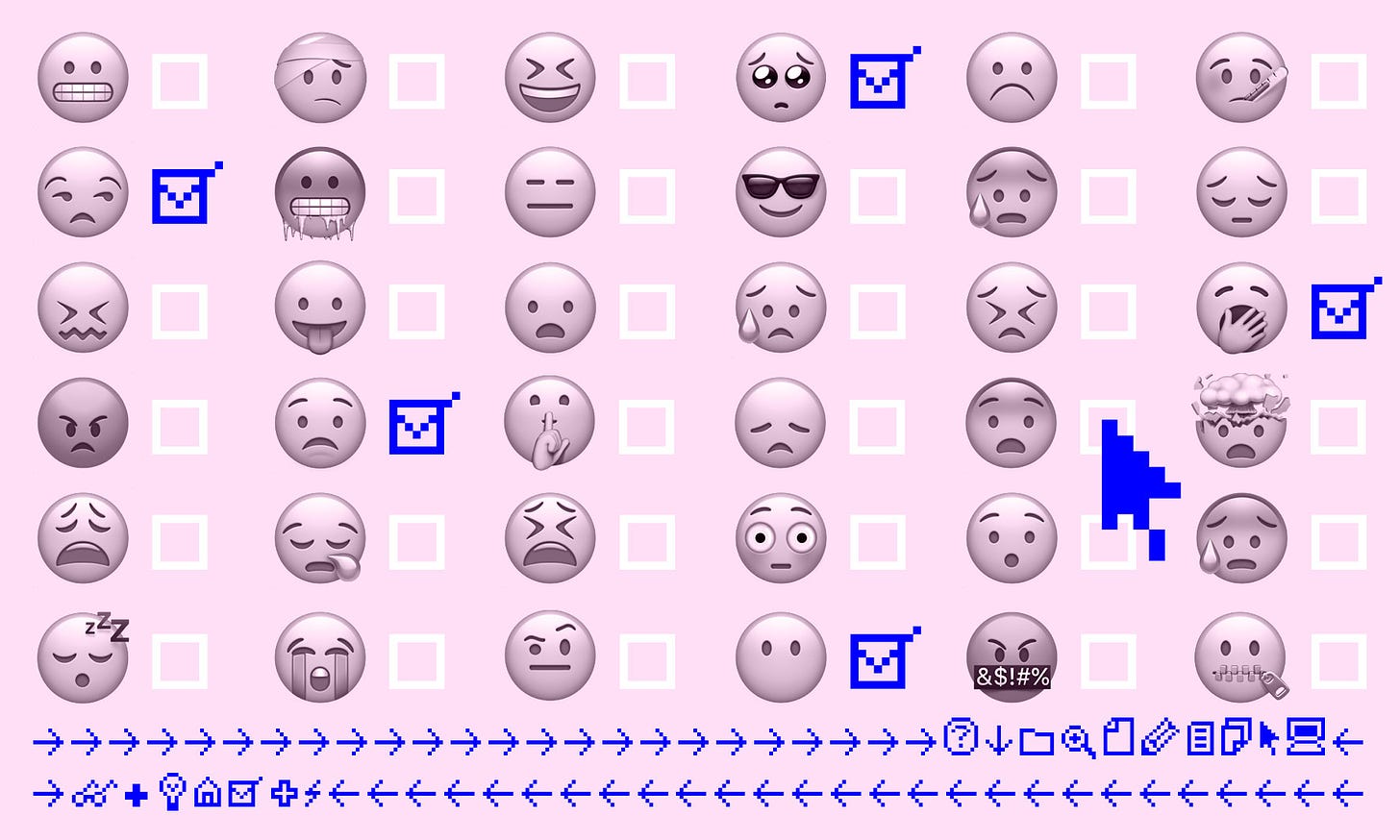NZ’s weapon against vaccine misinformation
The Covid-19 minister says New Zealanders aren't falling for misinformation like people overseas, an expert reveals why
Mōrena and welcome to The Bulletin for Friday, September 17, by Justin Giovannetti. Presented in partnership with Z Energy.
In today’s edition: The plan for level one, a legal threat to stop investigating the Wānaka couple, a new defence pact in the Pacific, but first, vaccine misinformation.
A protest in the US against Covid-19 restrictions. (John Moore/Getty Images)
There’s nothing holding back New Zealand’s vaccine campaign. That’s the message from Covid-19 minister Chris Hipkins after hundreds of thousands of extra Pfizer doses arrived in Auckland this week. The supply shortages are over and the government wants every Aucklander who can to get a jab by Sunday. With a possible move out of level four next week, delivering vaccines is now the most important part of the country’s Covid-19 response.
The 31%. However in recent days the vaccination programme has slowed considerably and nearly a quarter of eligible New Zealanders have yet to book a vaccine appointment. Only 69% have booked or received a second dose. Misinformation has played a role in fuelling vaccine hesitancy overseas, but it’s unclear what impact it might be having in New Zealand.
There’s nothing wrong with asking questions about the vaccine. People have a right to be curious about the Pfizer jab and what’s in it. The ministry of health has helpful information on that, including the ingredients, which are a tiny amount of mRNA with some fat, salts and sugar. The government notes that there are no animal products, fetal materials or microchips–there’s misinformation about all three floating around online.
Medsafe, the government’s medicine authority, also publishes all adverse reactions and confirmed deaths (only one) associated with the jab in a series of weekly safety reports. The latest one was put out on Wednesday. Earlier this week the country’s chief coroner had to respond to claims that an Auckland teenager had died as a result of receiving the vaccine, Stuff has reported. There’s no evidence of that.
Misinformation becomes problematic when it leaps from social media to the real world. Earlier this month a Covid-positive man absconded from a quarantine facility. The man’s social media feed was full of posts containing vaccine misinformation, The Spinoff has reported. “Misinformation kills,” microbiologist Siouxsie Wiles said at the time. “It kills because it encourages people to do terrible things.”
RNZ has the first-person experience of a family driven apart by a vaccine argument. It charts a familiar tale seen in many places overseas, where views from before Covid-19 have become more extreme.
The government says it isn’t overly worried about misinformation. There have been a number of small protests against the lockdown and vaccines in New Zealand, but nothing like the mass movements growing in Europe and North America, according to RNZ. However, there have been incidents, including earlier this week where Stuff reports two women were giving flyers with vaccine misinformation to teens leaving a Lower Hutt high school. I asked Hipkins for his thoughts on misinformation:
“What we're also seeing from overseas is that Covid-19 is morphing into a pandemic of the unvaccinated. Yes, vaccinated people are affected by it, but nowhere near as badly as unvaccinated people are…I think New Zealanders are more informed about vaccines than we are seeing abroad. We're not seeing people being sucked into misinformation at the same rate as they are around the rest of the world. I'm incredibly proud of New Zealanders for that,” said the Covid-19 minister.
There has been a change in the attitudes of some New Zealanders. A very unscientific way to track the changing approach to vaccine misinformation is through responses to this newsletter. The Bulletin has always enjoyed a healthy conversation with its readers (and please do keep it coming). Some of that feedback goes back years. In a few cases, people who may have been unhappy with lockdown last year and asking good questions about the country’s elimination approach have adopted increasingly bellicose language. The change has been pronounced since the country entered level four lockdown last month. What was once a grumble about He Puapua is now the contention of a mass coverup and complicity in global genocide.
But what does the data tell us? I asked Kate Hannah, a cultural historian at Te Pūnaha Matatini and an expert in misinformation, what’s going on. Few people in New Zealand are more qualified to talk about the situation. She said both Hipkins and the changing vibe of The Bulletin’s email inbox capture a snapshot of where this country is at. Her inbox has been similar to mine, she adds.
“What we’re also seeing is more insidious information around the vaccine programme. People who say they are seeking more information about the vaccine are using the pro-social language of love: ‘Only you can make the choices over your family and your body, we’re here to support you.’ But the point is to dissuade people from getting the vaccine,” she said. “For many people the idea of masks everywhere, especially outside Auckland, is very unusual. They are in that fear space and then getting the love language bombing is quite enticing.”
New Zealand has a secret weapon against misinformation. It’s the two degrees of separation thing and it’s why Hannah thinks Hipkins is right that misinformation isn’t as pronounced here. While it still happens, people in New Zealand are more likely to know who is spreading misinformation and speak with them about it. That human touch is important.
There’s also a second habit that is helping the country. Influencers who can dominate social media across the English-speaking world with misinformation don’t quite make it in New Zealand, according to Hannah. That slows things down.
“In New Zealand we like our misinformation packaged up by New Zealanders for us, which suggests that tactics need to change and we need local agents to pick it up. That localness gives us that one or two degrees of separation thing and the resilience that provides. People know each other better. There are advantages to being small,” she said.
If you like what you’re reading, we need your support. The Spinoff is doing our utmost to keep you updated on Covid-19 related news. Every dollar our members contribute directly funds our editorial team and is devoted to ensuring we do more. Click here to learn how you can support the team today.
Move to level one won’t happen while there’s transmission in Auckland. While the city might move down to level three next week, the prime minister has warned that a move to level one for the rest of the country is unlikely, according to Stuff. Experts have warned it could take weeks for transmission to come to fully end in Auckland. Despite that, the NZ Herald reports that the top Covid-19 expert in cabinet, associate health minister Ayesha Verrall, said the delta outbreak is nearly under control.
The Covid numbers: 13 new community cases were reported yesterday and 42% (5) of the previous day’s cases were active in the community while infectious. All the cases were in Auckland. 996 cases have now been detected in the delta outbreak and 460 have recovered. 62,782 people were vaccinated yesterday.
Tracking the pandemic. The Spinoff has a new Covid-19 tracker, designed by Harkanwal Singh, our recently appointed head of data. It’s a very useful tool to visualise the pandemic and understand what’s happening across Aotearoa, from case totals to how effective the alert levels are.
A legal threat for asking about the Wānaka couple. A district court judge whose son broke lockdown rules to travel to Wānaka has sent a legal threat to Stuff warning against it investigating the couple. Judge Mary-Beth Sharp put out a statement earlier this week saying she was “appalled” by her son’s actions. When Stuff followed up with a number of questions, the judge did not answer but hired a lawyer who called the questions defamatory and ordered reporters not to question people in Wānaka about the pair. An alternative strategy would have been to say no comment. Hiring a lawyer and sending legal threats won’t help the few voices who had called for sympathy towards the two offenders.
The three waters campaign faces new opposition from the body representing councils. Local Government NZ's president has said the proposed amalgamation of the country's water systems into a few large operators needs to stop, according to SunLive. With poor communication from the Beehive, according to LGNZ, councils are finding themselves in a position where they need to explain a central government plan to local communities without much information. In many cases, they aren't too sure about the plan themselves. The minister in charge, Nanaia Mahuta, told Q+A that opposition was “curious” because some of the councils most opposed would benefit the most. It’s clear at this point that the programme won't be an easy sell.
Australia, US and UK announce new defence pact. Dubbed Aukus, the new defensive alliance is aimed at containing China’s growing influence in the Indo-Pacific region, according to ABC. As part of the alliance, Australia will build a new class of nuclear submarines that could quietly prowl the South Pacific for decades to come. The three countries will share sensitive nuclear, cyber, artificial intelligence and quantum computing capabilities as part of the pact.
One country will be immediately angry and that’s France. Australia had signed a massive $90 billion deal to build a fleet of diesel submarines with the French. That agreement has now been torn up. The nuclear-powered boats will carry conventional weapons, but they’ll be based on advanced American and British designs that allow them to stay underwater nearly indefinitely.
New Zealand has been left out of what’s been dubbed the new Anzus. The Guardian reports that while prime minister Jacinda Ardern downplayed the country’s omission from the pact, calling it a deal over nuclear submarines, security experts say it’s a bigger deal. Not only does it mean that most naval ships from the English-speaking world will now be banned from New Zealand waters, it highlights a growing divide between Wellington and the country’s traditional allies. I wrote about the dilemma facing foreign minister Nanaia Mahuta earlier this year and yesterday’s announcement will only make it more difficult for her.
Can John Campbell dance? Stewart Sowman-Lund has written for The Spinoff about how TVNZ's Breakfast team has embraced viral dances in lockdown. The moves between Matty, Jenny and Jenny-May are pretty impressive. But newsman, and affable weather presenter in a pinch, John Campbell is nowhere to be seen. According to Matty, Campbell doesn't move, boogie or jive: “He's all hands”. The challenge is now out to see if Campbell can dance.
Got some feedback about The Bulletin, or anything in the news?
Get in touch with me at thebulletin@thespinoff.co.nz
Right now on The Spinoff: Josie Adams explores social media communities that are increasingly asking their members to self-diagnose as neurodivergent or mentally ill. Olivia Sisson writes about her love for Trade Me and especially its fresh produce section. Bernard Hickey contemplates whether a gentler, kinder capitalism is possible. Alex Casey speaks with The Apprentice's Vanessa Goodson about testing Covid-positive. Reweti Kohere reports on why there are so few women in the world of medical cannabis. Ben Gracewood explains who some New Zealand companies are falling prey to DDoS attacks in a helpful piece.
The All Whites will start the road to the 2022 world cup in Qatar after Pacific football matches were ruled out. Plans to hold the qualifying games in New Zealand collapsed when not enough spots in managed-isolation were made available for eight national teams. Similar plans for Fiji and New Caledonia also failed. Instead, the event is headed to the middle east in March, Stuff reports. The All Whites are currently the highest-placed team in the region’s rankings.
That's it for The Bulletin. If you want to support the work we do at The Spinoff, please check out our membership programme.







